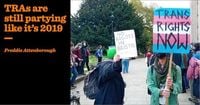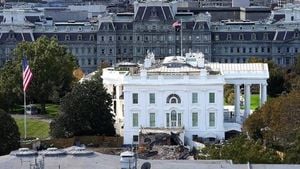On a brisk October afternoon in 2025, the University of Bristol’s normally tranquil campus became the latest flashpoint in a fierce and ongoing cultural battle over sex, gender, and free speech. Professor Alice Sullivan, a leading sociologist from University College London and the driving force behind the UK government’s Independent Review of Data, Statistics and Research on Sex and Gender, was scheduled to present findings from her government-commissioned inquiry. The event was intended to shed light on the complexities and challenges of recording sex and gender in official data, as well as the very real barriers faced by gender-critical researchers—obstacles ranging from difficulties in securing research ethics approval to outright hostility in academic and public settings.
But as Sullivan began her seminar at Bristol’s School of Policy Studies on October 22, a large and vocal protest erupted outside. Demonstrators brandished placards accusing the review of being “transphobic” and “commissioned by a Tory government,” while others hurled insults and banged on windows. The protest escalated rapidly; loudspeakers blared, chants drowned out Sullivan’s voice inside, and at one point, a fire alarm was triggered. Mounted police and university security were called to restore order, and organizers were forced to move the seminar to a higher floor just to keep the conversation going.
“The demonstration was apparently quite ugly, with mounted police needed. I have never experienced the like,” Sullivan later wrote on X, describing the incident as “a surreal moment.” She thanked the department and security team for ensuring that her talk could proceed despite the chaos.
This wasn’t Sullivan’s first brush with controversy. Back in 2020, her invitation to speak at a NatCen Social Research seminar about the British census was withdrawn after internal complaints alleging that she held “anti-trans views.” A similar episode unfolded in 2024, when the Canadian Department of Justice abruptly canceled her planned International Women’s Day lecture on the risks of prioritizing self-declared gender identity over biological sex in official data. Both times, the reasons for the cancellations were left unstated—but, as Sullivan observed, “we both knew what the reason was.”
The events at Bristol reflect a much broader and deeply polarized debate within academia and society at large. Gender-critical scholars like Sullivan argue that biological sex is an immutable, binary characteristic—male or female—and warn that conflating sex with gender identity undermines the accuracy of data on everything from health outcomes to crime statistics. On the other side, advocates of gender-identity theory maintain that gender is a spectrum and that binary classifications are both socially constructed and exclusionary. For some trans activists, any defense of sex-based data is seen as an existential threat to trans identities, fueling impassioned—and sometimes disruptive—protests.
These tensions are hardly confined to university campuses. Just days after the Bristol seminar, a national controversy erupted in the United States following the shooting of Charlie Kirk, co-founder of the conservative student organization Turning Point USA, by Tyler Robinson at Utah Valley University on October 25, 2025. As reported by the Wall Street Journal, early coverage mistakenly claimed the bullets used in the attack were inscribed with “transgender ideology”—a detail that was quickly debunked by advocates and major outlets, including The New York Times.
Still, the narrative gained traction in some right-wing circles, amplified by the memory of an August 2025 shooting at a Minneapolis Catholic school by a transgender woman. Conservative politicians and media figures seized on these tragedies to intensify anti-trans rhetoric. Representative Nancy Mace (R-SC) called for all trans people to be institutionalized, even using a slur on the House floor. The Los Angeles Times published a controversial op-ed by commentator Josh Hammer, linking “transgenderism” to violence—a claim that was later challenged in a letter to the editor for its deliberate misinformation and use of derogatory language. “Transgenderism … found itself implicated in another horrific shooting,” Hammer wrote, a statement that critics say perpetuates dangerous stereotypes and ignores the reality that trans people are far more likely to be victims, not perpetrators, of violence.
Meanwhile, figures like Robby Starbuck, an adviser on AI bias for Meta, have used their platforms to spread disinformation about shootings, transgender people, vaccines, crime, and protests. “People should be able to find safe, welcoming communities online. Robby Starbuck pushes a dangerous anti-LGBTQ agenda, spreading disinformation and denying the very existence of transgender people,” Eric Bloem, vice president of corporate citizenship at the Human Rights Campaign Foundation, told The Guardian.
The political landscape surrounding trans rights has shifted dramatically in recent years. In June 2025, the U.S. Supreme Court ruled in U.S. v. Skrmetti that bans on gender-affirming care for transgender minors are constitutional, echoing language from the controversial 2022 Dobbs decision on abortion. Yet, unlike the uproar that followed Dobbs, Democratic leaders have largely distanced themselves from trans issues, opting for centrist positions. Representative Julie Johnson (D-TX), co-chair of the Congressional Equality Caucus, stated, “health care should be at the right and the role of the parent … the Supreme Court has ruled,” adding that Democrats must support the rule of law. In her 2025 memoir, Kamala Harris acknowledged her campaign’s failure to counter Trump’s attacks on trans rights, expressing a “deep connection” with transgender people but voicing concerns over trans-inclusive sports policies.
The sports debate has become a particular flashpoint. Representative Tom Suozzi (D-NY) told The New York Times in November 2024, “I don’t want to discriminate against anybody, but I don’t think biological boys should be playing in girls’ sports.” The Times presented his statement without context or correction, despite repeated challenges from trans advocates and scientific experts. Joshua D. Safer, executive director of the Mount Sinai Center for Transgender Medicine and Surgery, explained to the ACLU that “a person’s genetic make-up and internal and external reproductive anatomy are not useful indicators of athletic performance.”
Beyond sports, the fundamental safety and rights of transgender people remain at stake. Conservative think tanks like the Heritage Foundation have called for the FBI to designate “Transgender Ideology-Inspired Violent Extremism” as a domestic terrorism threat, citing dubious statistics that they could not substantiate when pressed by Wired. Major media outlets—including The New York Times, Washington Post, and CNN—have largely ignored these developments, allowing such narratives to fester in right-wing circles.
Media coverage itself often falls short. The New York Times frequently quotes figures like Tony Perkins, president of the Family Research Council—a group designated as an anti-gay hate group by the Southern Poverty Law Center—without adequately contextualizing their record. When extremist narratives are presented as legitimate policy debates, the public’s perception is skewed, and space is created for fringe ideologies to gain mainstream traction.
Back at Bristol, the university’s decision to relocate Sullivan’s seminar and ensure it continued was consistent with its obligations under the Higher Education (Freedom of Speech) Act 2023. The Office for Students’ guidance is clear: protest is protected, but not when it prevents others from speaking—a so-called “heckler’s veto.” By taking action, Bristol met its statutory duties, but the scale of the disruption raises a broader question: can laws alone protect academic freedom from intimidation? Without a cultural shift toward open debate and mutual respect, the answer remains uncertain.
As attacks on trans communities intensify—politically, rhetorically, and sometimes physically—the need for responsible journalism, principled leadership, and genuine dialogue has never been greater. Anything less risks not only the integrity of our public discourse but the safety and dignity of those most vulnerable to its failures.




